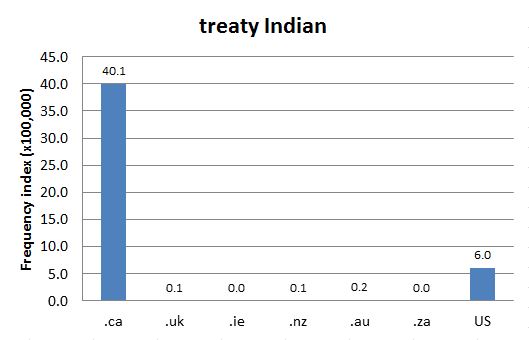DCHP-2
treaty Indian Treaty Indian DCHP-2 (July 2016)
n. — Aboriginal, First Nations
a member of a First Nation that has a treaty with the Crown (see treaty meaning 1a).
Type: 5. Frequency — As outlined in the Indian Act of 1876, a treaty Indian is a status Indian belonging to a First Nation that has signed a treaty with the government of Canada (see Canadian Encyclopedia, s.v. "Indian"). According to these treaties, the groups who have signed cede their lands to the Crown in return for certain benefits. Aboriginal people who reside in areas where treaties were not made or who have not taken treaty are known as "Registered Indians". Though the term has also been used in the US (DA, s.v. "treaty Indian"), it appears far more frequently in Canada (see Chart 1).
See also COD-2, s.v. "treaty Indian", which is marked "Cdn", ITP Nelson, s.v. "treaty Indian", which is marked "Canadian.", and OED-3, s.v. "treaty Indian", which is marked "now chiefly Canad.", AHD-5, s.v. "treaty Indian", which is marked "Canadian".See also: Indian Act non-treaty Indian treaty (meanings 1a, 4) treaty money non-treaty ((n.)) First Nation status treaty band
- Because of negative colonial connotations, "Indian" is seen as outdated by some and can be considered offensive. Although semantic change is underway, replacing "Indian" with more appropriate terms such as First Nation member, Aboriginal person, or Indigenous person, the term "Indian" and some of its compounds are current legal terms (see NAHO reference).
References:
- AHD-5
- COD-2
- Canadian Encyclopedia "Indian" Accessed 28 Jul. 2016
- DA
- ITP Nelson
- NAHO "Publications: Terminology" Accessed 5 May 2014
- OED-3 s.v. "treaty Indian" Accessed 5 May 2014
Images:
Chart 1: Internet Domain Search, 5 May 2014
